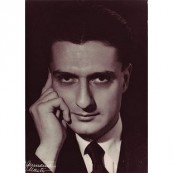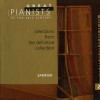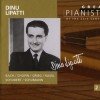| Voice/Instrument: | Pianoforte |
Biography
Dinu Lipatti (Romanian pronunciation: [ˈdinu liˈpati]; 1 April [O.S. 19 March] 1917 – 2 December 1950) was a Romanian classical pianist and composer whose career was cut short by his death from Hodgkin's disease at age 33. He was elected posthumously to the Romanian Academy.
Lipatti was born in Bucharest into a musical family: his father was a violinist who had studied with Pablo de Sarasate and Carl Flesch,[1] his mother a pianist. For his baptism, which occurred not shortly after birth as is usual, but when he was old enough to play the piano, the violinist and composer George Enescu agreed to be his godfather. Lipatti played a minuet by Mozart at his own baptism.[1] He studied at the Gheorghe Lazăr High School, while undergoing piano and composition studies with Mihail Jora for three years. He then attended the Bucharest Conservatoire, studying under Florica Musicescu, who also taught him privately.[1] In June 1930, the best pupils at the Conservatoire gave a concert at the Bucharest Opera, and the 13-year old Lipatti received a huge ovation for his performance of the Grieg Piano Concerto in A minor.[1] In 1932 he won prizes for his compositions: a Piano Sonatina, and a Sonatina for Violin and Piano. That year he also won a Grand Prize for his symphonic suite Les Tziganes.[1]
He entered the 1933 Vienna International Piano Competition but finished second, because the jury considered him too young. Alfred Cortot, who thought Lipatti should have won, resigned from the jury in protest.[2] Lipatti subsequently studied in Paris under Cortot, Nadia Boulanger (with whom he recorded some of Brahms's Waltzes Op. 39), Paul Dukas (composition) and Charles Munch (conducting). He gave his first concert, at the École Normale, on 20 May 1935. However, three days before the concert, Paul Dukas died; in memory of Dukas, Lipatti's first piece at his concert, and the piece he first publicly performed as an adult pianist, was J. S. Bach's Jesu, Joy of Man's Desiring.[1]
Lipatti's career was interrupted by World War II. Although he continued to give concerts throughout Europe, including Nazi-occupied territories, he eventually fled his native Romania in 1943 and settled with his wife (Madeleine Cantacuzene, also a concert pianist) in Geneva, Switzerland, where he accepted the position as piano professor at the conservatory. It was at this time that the first signs of his illness emerged. At first, doctors were baffled, but in 1947 he was diagnosed with Hodgkin's disease.[3] As a result, his public performances became considerably less frequent after the war.
Lipatti gave his final recital, which was recorded, on 16 September 1950 in Besançon, France. Despite severe illness, he gave unmatched performances of Bach's Partita in B flat major, Mozart's A minor Sonata, Schubert's G flat major and E flat major Impromptus, and thirteen of Chopin's Waltzes. He excluded No. 2, which he was too exhausted to play; he offered instead Myra Hess's transcription of Bach's Jesu, Joy of Man's Desiring, the piece with which he had started his professional career as a pianist in 1935. He died less than 3 months later, in Geneva. Lipatti is buried at the cemetery of Chêne-Bourg next to his wife Madeleine, a noted piano teacher.
Lipatti's piano playing was, and is, widely appreciated for the absolute purity of his interpretations, at the service of which he used a masterful pianistic technique. Lipatti is particularly noted for his interpretations of Chopin, Mozart and Bach, but he also made recordings of Ravel's Alborada del Gracioso, Liszt, Enescu, and the Schumann and Grieg piano concertos. His recording of Chopin's Waltzes has remained in print since its release and has long been a favorite of many classical music-lovers.
Lipatti never recorded any music of Beethoven. It is a common misconception, however, that Lipatti did not perform Beethoven's music until late in his career. The Waldstein Sonata had been a feature of Lipatti's repertoire since 1935. He also performed the Emperor Concerto in Bucharest twice during the 1940-41 season, and even stood ready to record it for EMI in 1949. An internal memo from Lipatti's recording producer Walter Legge, dated 23 February 1948, states that "Lipatti ha[d] his heart set on doing a Beethoven Concerto in 1949" and nominates the Emperor Concerto, given that Lipatti had already performed it.
A recording of Chopin's Piano Concerto No. 1 in E minor, originally released under Lipatti's name, and said to have been a recording of a live performance in Switzerland in May 1948, proved not to be his contribution at all. In 1981, it emerged that the soloist on this recording was in fact a Polish pianist (and a fellow Cortot pupil), Halina Czerny-Stefańska, the joint winner of the 4th International Chopin Piano Competition, playing with the Czech Philharmonic Orchestra under Václav Smetáček. However, later on, an authentic recording by Lipatti of the Chopin Concerto was found.[4]
Pulitzer Prize-winning music critic Harold C. Schonberg wrote of Lipatti's 1947-48 Chopin concert recordings: "this is piano-playing of a stature that few artists of his generation could have come near approaching".







